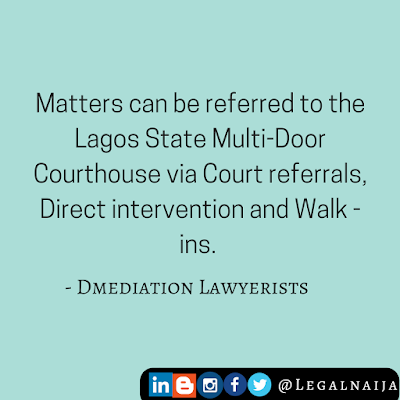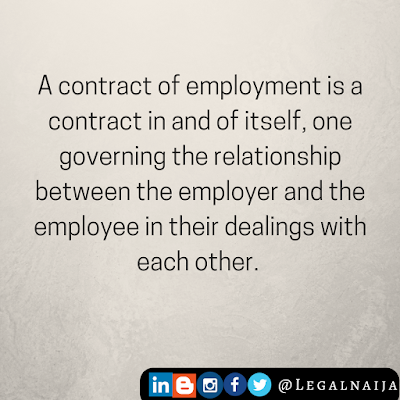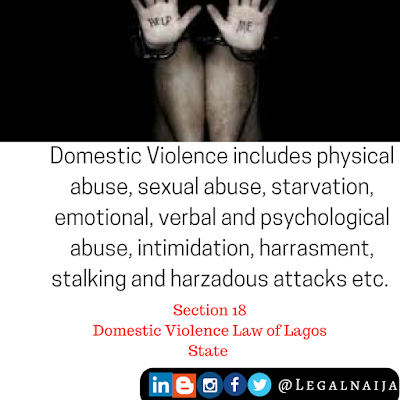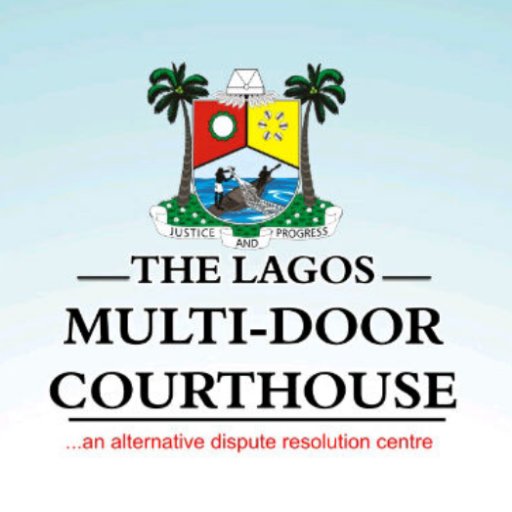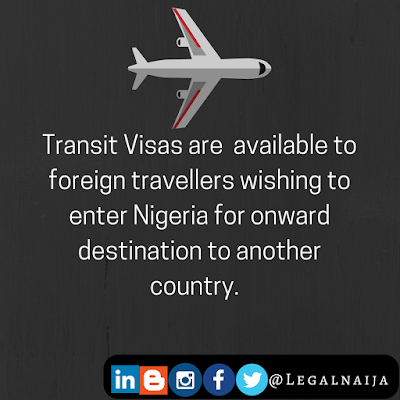The care, custody and welfare of children (under the age
of 18) in Nigeria are strict functions of an intricate regulatory framework
comprising institutions and laws; beginning quite naturally with the Constitution
of the Federal Republic of Nigeria 1999, as amended. Section 17(3) (f) of the
law particularly imposes a non-actionable obligation on the Nigerian Government
to ensure that children and young persons are adequately shielded from
exploitation, moral and material neglect.
This protection is also deemed an inherent responsibility
of parents and therefore, it is not uncommon to see our substantive criminal
laws impose an obligation on parents to avail their children or wards with
basic life needs as well as prescribe punishments for failure to intentionally
make such provisions (See sections 300 –
305 of the Criminal Code Act). In the absence of parents or guardians on
which to foist these obligations, the law provides for a number of alternative
measures to protect children that would otherwise be deprived. The same basic
principles generally apply in all Nigerian states with minimal disparities. For
the purpose of contextual streamlining however, the relevant operational
framework in Lagos State will be examined.
When a child is without a parent or guardian, the
Lagos state government is expected to take custody of the child and facilitate
his/her placement in one of the select orphanages in Lagos state. Consequently,
the child becomes a ward of the State, subject to the supervision of the
Ministry of Youth, Sports and Social Development. The existing legal and regulatory
framework is further structured to provide a number of ways by which the
average Nigerian citizen or a foreigner can formally seek to be vested with the
capacity to take optimum care and responsibility of such children, pursuant to an
order of a court of competent jurisdiction. Thus, it is an offence punishable
by law for any person to exercise certain rights, powers and obligations over a
child within contemplation prior to applying for and obtaining the requisite approval
from the relevant authorities. These legal arrangements are identified and
discussed below:
1. Fostering:
A
person or couple may appropriately make an application for a “Fostering Order”
in respect of a child that is orphaned, abandoned, deserted by relatives,
abused, found wandering or destitute (See
Section 92 Child Rights Law of Lagos State 2015). The application may be
made by a sole applicant or jointly by a couple. The Court may however require
the consent of a relative i.e. a grandparent or other persons related to the
child before it makes the grant.
Upon
the grant of the Fostering Order, the child will stand to the foster parents in
the same position as the children born to the foster parents in a lawful
marriage. The Fostering Order may subsequently be revoked by the court if it
deems it appropriate.
Note
the following additional details about fostering:-
i.
Once an application for fostering is made, the Adoption Unit of the Lagos State Ministry of Youths,
Sports and Social Development (The Unit) must
also be notified. If the child is not already in the custody of the Unit, it is
the Unit’s practice to immediately take custody of the child and place it in an
approved orphanage pending the ruling of the court.
ii. If the order
is granted, the custody of the child may be released to the foster parents but
the Unit must be constantly apprised of the child’s status at all times and a
designated social worker may periodically visit the home of the parents to
conduct this assessment.
iii. If the child
is to be taken out of the country by the foster parents, the court must be
notified before and after the child returns.
iv. Giving possession of the fostered child to another
person for fostering outside Lagos or Nigeria attracts prison terms of 10 and
15 years respectively. See section 108 (2) & (3) of the CRL
respectively.
Execution Timeline: 2
– 4 months from date of application
2. Guardianship:
This
is perhaps the most flexible and quickest legal arrangement for taking care and
custody of the children in contemplation. The parents of a child are his/her
default guardians. However, in the absence of the parents or any other family
member of the child or appropriate authority, an unrelated party may apply to
be appointed a guardian and vested with the capacity to exercise parental
responsibilities over such a child. (See sections 75 & 76 of the
CRL of Lagos State 2015. If unconditionally granted, a guardian will have
all parental and incidental responsibilities over the child to the full extent
permissible by law. A guardianship Order can subsequently be revoked or
substituted by the guardian, a natural parent or an appropriate authority.
Otherwise, the order will subsist until the child attains the age of majority.
Note
that unlike a fostering order which can only be granted solely to an applicant
or jointly to a couple, a guardianship order can be granted to the parents of
the child and an unrelated person, appointing them all as joint guardians of
the child. In addition, the supervision of guardianship applications is within
the ambit of the court and not the Lagos State Ministry of Youth, Sports and
Social Development (MYSD). Hence the MYSD need not be involved in a
guardianship application as long as the child is not yet a ward of the
government and resident in an orphanage. Note that a guardian is
also empowered to appoint by deed in his or her lifetime, another guardian of
the child in the event of such guardian’s death.
Execution
Timeline: 1 – 3 months
from date of application
3. Adoption:
The
law also permits the adoption of children without parents or guardians, subject
to a number of clearly expressed rules outlined in the Child’s Rights Law and
Adoption Laws of Lagos as well as other subsidiary adoption regulations. Before
an adoption order can be made, the applicant must have informed the MYSD of
his/her intention to undertake the proposed adoption, at least one year prior
to making an application, and obtained the requisite approval to apply for the
contemplated adoption. The prospective adopter must also show evidence of
having bonded with the child and must have undergone certain adoption training
sessions organised by the Lagos State Ministry of Youth, Sports and Social
Development.
While
International/cross country adoptions are not prohibited, a prospective foreign
adopter must first provide evidence showing that that requisite approvals to adopt internationally
have been granted by the relevant authority of the foreign country where the
adopted child is sought to be subsequently taken e.g. (in the United States,
the USICS Form I-600 must have been appropriately filed and approved) and the
contemplated adoption must be effected through an approved Adoption Agency in Lagos
State e.g. the Literacy Integration and Formal Education (LIFE) Foundation in
Victoria Island, Lagos. If one spouse is Nigerian, the adoption may be
undertaken as a local adoption. It should however be clearly stated that a
combined reading of sections 145(1) and 131(1)(b), (c) and (d) of the Child
Rights Act would reveal that inter country adoptions may not be allowed in
Nigerian States that are yet to domesticate the Child Rights Act into state
laws.
Upon the making of
an adoption order, all legal connection between the child and his/her
biological parents (including but not limited to the use of surname,
maintenance, education, religion, discipline, welfare, travelling and marriage
approval) is completely severed and all parental rights and responsibilities in
respect of the child are vested on the adoptive parent(s). The implication of
this accounts for the length and complexity of the process. Also, in the event
of the death of the adoptive parent(s), the child will be treated as their
biological child for the purpose of devolution of property. See section 13 of the Adoption Law of Lagos.
Execution Timeline: 12 – 18 months from date of
application (beginning from when a specific child has already been identified
and marked for adoption)
CONCLUSION
As outlined above, a number of options are available
to formally cater for the welfare, care and custody of children, all of which are
administered and supervised by a functional legal framework. These options are
mutually exclusive as they cannot all be obtained in respect of one child at
the same time, the court will also refuse to grant any of these orders unless
all requisite steps have been complied with and all documents submitted,
properly vetted and deemed satisfactory enough to warrant a grant of the
requisite approval. If adoption is contemplated in the long run, either of the
other options highlighted above can temporarily be applied for because of their
relative flexibility and because they vest similar parental rights and
obligations on the applicant, pending when an approval for adoption has been
obtained and the process commenced. Note that the Guardianship or Foster Order must
be revoked by the court before an Adoption Order can be made.
Conclusively, it is imperative that that every action
by an individual, public or private body, institution, court of law,
administrative or legislative authority in respect of a child must be
undertaken with the child’s best interest as the primary consideration (See section 1 of the CRL of Lagos State,
Odogwu v. Odogwu (1992) 2NLWR (Pt 225 @ 539). Hence, the grant of a
relevant order is ultimately at the discretion of the court (a factor that is
usually guided by the overall impact of the contemplated arrangement on the
child in question) and thus, a proper application for any of these options does
not guarantee an automatic approval, the full satisfaction of all condition
precedents notwithstanding.
Temitayo
Ogunmokun is a legal practitioner at a Commercial Law Firm in Victoria Island,
Lagos. His areas of practice include Corporate, Immigration, Taxation and
Family Law. He is a volunteer legal adviser to the Literacy Integration and Formal
Education (LIFE) Foundation (a Non-Profit organization, specially approved to
facilitate cross country adoptions by the Lagos State Government) and a published
poet and writer.
